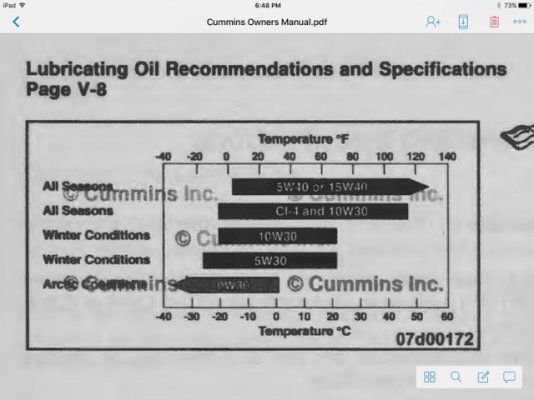I excerpted this from
Cummins Service Bulletin 3810340-06, 11-MAY-2007 at Seaboard Marine.
Cummins Inc. Recommended SAE Oil Viscosity Grades
Cummins Inc. primary recommendation is for the use of 15W40 multigrade for normal operation at ambient temperatures above -15°C [5°F]. The use of multigrade oil reduces deposit formation, improves engine cranking in low temperature conditions, and increases engine durability by maintaining lubrication during high temperature operating conditions. Since multigrade oils have been shown to provide approximately 30 percent lower oil consumption, compared with monograde oils, it is important to use multigrade oils to be certain your engine will meet applicable emissions requirements. While the preferred viscosity grade is 15W-40, lower viscosity multigrades can be used in colder climates.
Oils meeting API CI-4 and CJ-4 and a 10W30 viscosity grade, must meet a minimum High Temperature / High Shear viscosity of 3.5 cSt., and ring wear / liner wear requirements of Cummins Inc. and Mack tests. Thus, they can by be used over a wider temperature range than 10W30 oils meeting older API performance classifications. As these oils will have directionally thinner oil films than 15W40 oils, top quality Fleetguard® filters must be used above 20°C [70°F]. Some oil suppliers might claim better fuel economy for these oils. Cummins Inc. can neither approve nor disapprove any product not manufactured by Cummins Inc. These claims are between the customer and the oil supplier. Obtain the oil supplier's commitment that the oil will give satisfactory performance in Cummins® engines, or do not use the oil.
WARNING
An SAE 10W30 designation on a product is a viscosity designation only. This designation alone does not imply that the product meets Cummins Inc. requirements. Only 10W30 oils with diesel performance credentials listed in table 1 can be used in Cummins® Engines if the reduced ambient temperature indicated in Figure 1 is observed. Only 10W30 oils meeting CES 20078 (API CI-4) and CES 20081 (API CJ-4) can be used in the ambient temperature range similar to 15W40 oils.
Synthetic Oils
Use of “synthetic engine oils” (those made with API group 3 or group 4 base stocks) is permitted subject to the same performance and viscosity limitations of petroleum (mineral) based engine oils. The same oil change intervals must be applied to synthetic oils that are applied to petroleum (mineral) based engine oils.
Monograde Oils
Use of monograde oils can affect engine oil control. Shortened drain intervals might be required with monograde oils, as determined by close monitoring of the oil condition with scheduled oil sampling.
All in all, this is a very interesting service bulletin. I would recommend that anyone with Cummins power download and read it. Actually, I think it would be good reading for anyone interested in diesel lubrication, regardless of manufacturer.




